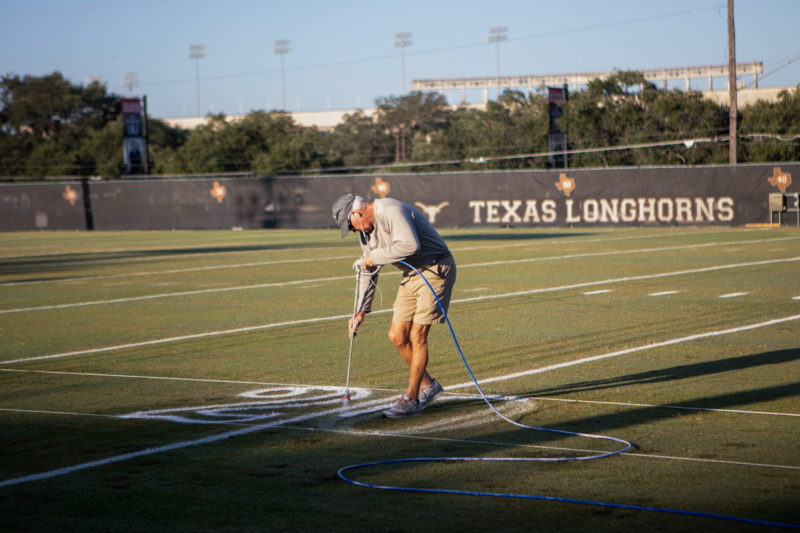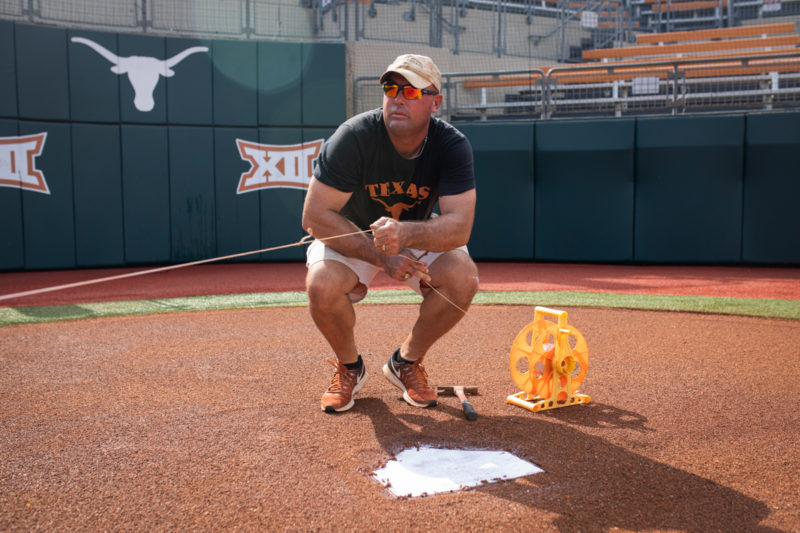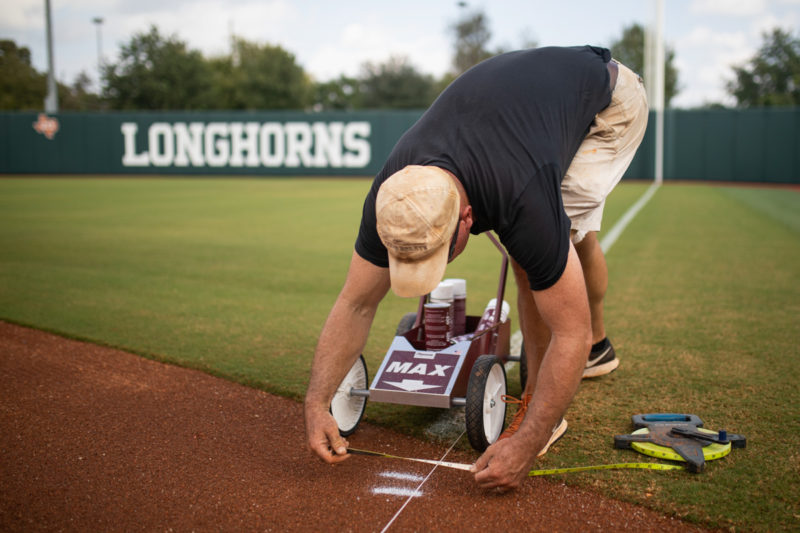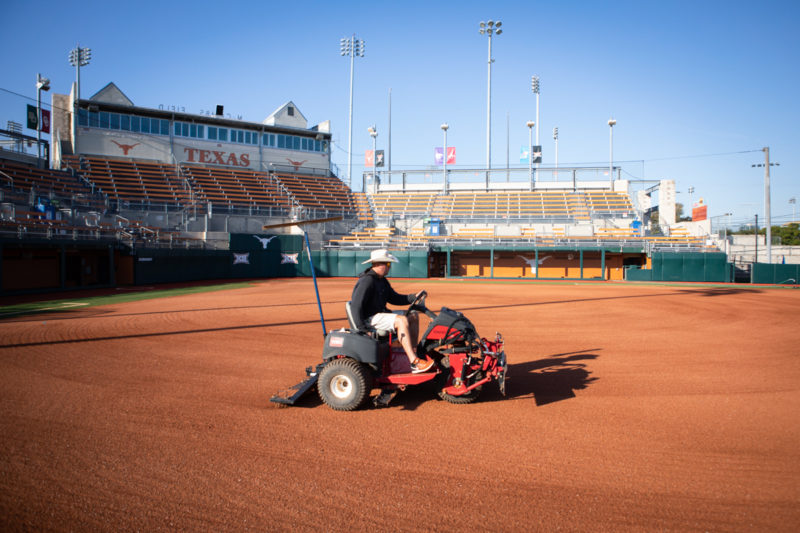Grass Whisperers Keep UT-Austin Fields Green and Growing
By Gage Trexler
Reporting Texas

Brook Whitaker, one of the turf specialists with Texas Athletics, paints the numbers at the Denius practice fields. Salvador Castro/Reporting Texas.
Jeremy King left his office on the west side of Darrell K Royal-Texas Memorial Stadium in his Toro Workman. He headed for the Frank Denius Fields.
It was just another cool October morning of work for him in the outdoors. It was an off day for the football team, which meant a full day of work for King. When he arrived with three of his co-workers, they began painting the practice fields, most of it done with their field striping machines, which they ride like a heavy-duty lawn mower. Every line, every hash mark and every number received a fresh coat of paint as they do every Monday. It’s a process that usually takes three hours to complete.
King is the athletic field and turf specialist at the University of Texas at Austin. He’s been taking care of fields at UT for 13 years, doing a job that isn’t for everyone. It that requires work under the sun for the majority of the day and minimal time in the office. It demands long and dedicated hours. It’s a job that fits King perfectly.
King has a special connection to the grass he grows. He spends every day with it. He nurtures it and makes sure that every square inch of it is accounted for, being in the best shape it can possibly be. He grew up in a small town near Greensboro, North Carolina. called Reidsville, with a population of just 14,000. His father was a law enforcement officer and his mom was a teacher. He was part of a Southern Baptist family.
“I always knew I wanted to do something outside. I’m not much to sit in offices,” King said.
Much of that love for working outside came from his grandmother.
“She’d always take me out and we’d work on her garden, bushes, vegetables,” King said.
King began landscaping in just the seventh grade. By the age of 13, he decided to go to school for landscaping, architecture or golf course maintenance.
He earned a degree in agronomy at North Carolina State University. King started at Texas in 2005 as a “floater,” helping out where he could. Now he’s in charge of overseeing all turf operations at the Denius Fields, Disch Falk Field, Mike A. Myers Stadium and Red and Charline McCombs Field. He also helps out with the grounds surrounding the tennis courts and keeping the Lyndon B. Johnson lawn healthy during tailgate season.
The softball field takes the most time, he said, because of all the dirt that has to be managed. He does it through a process of patching, which involves adding and flattening dirt.
“You’re patching bullpens every day, patching dirt, patching the batter’s box, patching the actual pitching rubber, you have to etch the field once a week, mow the field every three or four days,” King said.
He gets help from Weston Floyd, the man in charge at Red and Charline McCombs Field.

Weston Floyd measures the distance from first base to the home plate to create the foul lines needed for the softball game. Salvador Castro/Reporting Texas.

Floyd makes a final measurement before painting the foul lines between home and first base. Salvador Castro/Reporting Texas.
On the other side of Interstate 35, at the softball field that same October morning, Floyd sat in his three-wheeled Workman with a box blade attached to smooth the dirt over. The Longhorn softball team had improved to 4-0 the previous Saturday and had a Halloween double-header scheduled later in the week.
Donning a white cowboy hat, Floyd worked his way to the mound. He swept it and used a steel tamper to flatten the dirt, keeping it level.
Floyd’s father was a county agent for Texas A&M, so he was involved in agriculture most of his life. Even at a young age, he had a love for working with grass in particular. Like King, Floyd always wanted to be outside.
He majored in agronomy at Texas A&M before becoming the head turf manager at the University of Texas at Tyler. He then moved to Austin and started working on the softball field in 2013.
“At softball, the work is more than a regular field. We have to work the dirt,” Floyd said. “That means watering, dragging, and keeping moisture in it so it’s not too hard or too soft.”
Floyd works with the 5,500 square feet of dirt every day. He has 25,820 square feet of latitude 36 hybrid Bermuda grass to attend to as well.
“We have to patch all the holes the pitchers and batters create with clay, so that is all done by hand and takes time,” Floyd said. “We also clean out the dugouts, blow out the batting cages and haul trash.”

Floyd evens the turf at the Red and Charline Mccombs Field. Salvador Castro/Reporting Texas
Floyd mows the grass weekly. He topdresses it, a process in which sand is applied over the top of the grass and brushed in. He verticuts and dethatches the outfield which removes old, dead grass from the soil. He also fertilizes and sprays any chemicals that are needed.
Most of that couldn’t be done without the triplex mower Floyd uses. It’s the same one used on golf greens. He cuts it at precisely 5/8th an inch high.
Back at the Denius Fields, King and his crew departed for Mike A. Myers Stadium after finishing the enormous paint job on the more than 350,000 square feet of Bermuda grass. The task is the same there, except there’s much less to paint with just the sidelines and center field needing to be attended to.
“I don’t sit down a lot. I haven’t had a day off since mid-June,” King said.
The off-days for the athletes are ironically his busiest days. On Mondays, the football team has its day off, so King uses that time to repaint the Denius Fields and distribute fertilizer.
Every day, he’s working dirt with Floyd for softball practice and doing the same for baseball in their bullpen after their pitching sessions.
“I usually get all the manual labor done around five or six, then I’m making sure (Texas football head coach Tom) Herman’s happy and all these coaches, making sure everything’s good,” King said.
Floyd and King are two of just four turf specialists at UT. It’s job that doesn’t allow weekends or even a set schedule. With all that this job demands, it’s easy for it to feel monotonous and unimportant at times, but King’s special moment is when the final product is in front of him. It’s the moment that makes all the work worth it for him.
When the football season finally gets rolling along, game days are the type of events that also make his job worth it. On those game days, King is busy helping Bevo get on the field and getting the visiting team situated at the north end zone. Operational tasks like these on game days make his job a whole lot of fun. Doing it at the University of Texas just means that much more.
“Getting here to this level is a big deal to me,” King said. “This is the biggest athletic department in the country.”
He often thinks of gardening with his grandmother. He remembers how it felt to work the soil and care for those bushes and vegetables in North Carolina.
“It’s a sense of satisfaction,” King said. “Paint a football field, do this and that. You get to see what you did.”
He also gets to see what’s left to do. After parking the Workman for the night, King thought about what needed to happen in the morning. There were lines to paint. There was grass to cut. The dirt on the softball field needed to be smoothed. It had been another long day. Another long one awaited.